Hiring the right WordPress developer can significantly influence the success of your web projects. Often, companies struggle because they either don't fully understand the specific skills needed or they underutilize available resources to assess candidates effectively. Identifying a candidate who not only understands the technical intricacies of WordPress but also aligns with your organizational goals can be a game changer.
In this comprehensive guide, we cover every aspect of hiring a WordPress developer, from the hiring process to understanding key qualifications. We also provide insights into skill assessments and interview structuring. For further details on skills assessments, check out our skills assessment tools.
Table of contents
Why Hire a WordPress Developer?
Hiring a WordPress developer can solve specific problems your business faces with its website. For example, if your e-commerce site is slow to load or lacks custom features, a WordPress expert can optimize performance and create tailored functionalities.
WordPress developers can also help with:
- Enhancing website security
- Implementing responsive designs for mobile users
- Integrating third-party APIs and plugins
Consider hiring a full-time WordPress developer if you have ongoing website needs or multiple projects. For one-off tasks or smaller projects, working with a freelance WordPress developer might be more cost-effective.
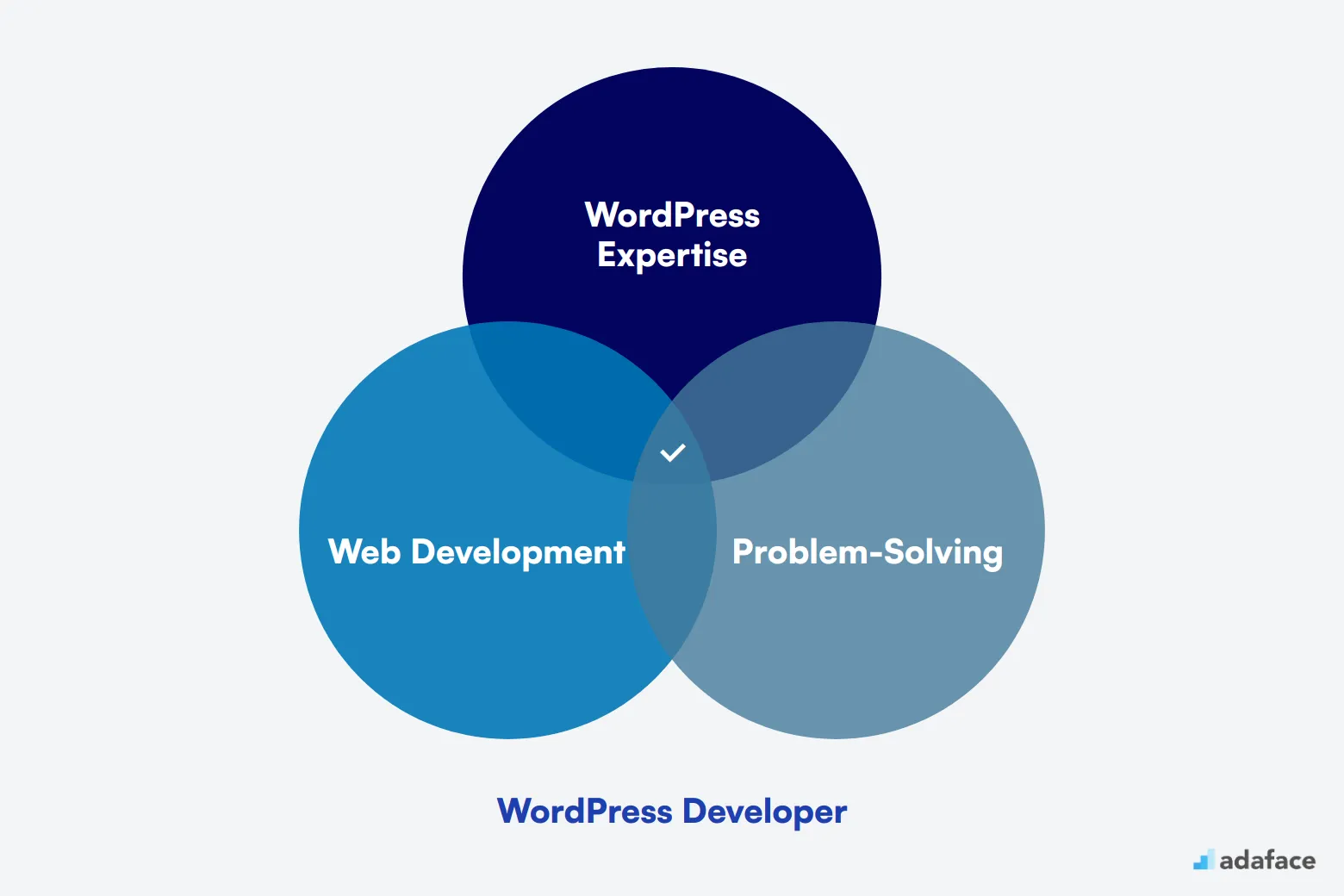
WordPress Developer Hiring Process
Hiring a WordPress Developer can seem daunting, but with a structured process, you can identify the right fit efficiently. Here's a quick overview of the steps involved.
- Craft a Job Description: Start by creating a clear and detailed WordPress Developer job description. This will set accurate expectations and attract suitable candidates.
- Advertise the Position: Post the job on relevant platforms where talented developers are likely to be searching.
- Resume Screening: Once resumes start coming in, conduct a preliminary screening to shortlist candidates who meet your criteria.
- Skill Assessment: Use tailored tests, such as coding or technical assessments, to evaluate the candidates' capabilities. This is where online assessment platforms can be very helpful.
- Interviews: Conduct interviews to gauge the candidates' problem-solving skills and cultural fit. Structured interviews can help maintain consistency.
- Final Selection: Choose the candidate who best aligns with your technical needs and company culture. Extend an offer soon after.
In summary, hiring a WordPress Developer involves crafting a precise job description, screening resumes, assessing technical skills, and conducting interviews. With this structured approach, you can expect the process to take about 1-2 months. Following these steps will guide you toward making a confident hiring decision. Let's expand on each step for a deeper understanding of the process.
Key Skills and Qualifications for Hiring a WordPress Developer
When hiring a WordPress developer, it can be tricky to distinguish between what's necessary and what's simply nice to have. Many recruiters may overlook certain technical proficiencies or assume specific frameworks are universally required. To build an effective candidate profile, it’s essential to clearly outline required and preferred skills based on your team's unique needs.
Start by focusing on core competencies such as:
- Proficiency in PHP and WordPress core
- Experience with HTML, CSS, and JavaScript
- Understanding of WordPress theme and plugin development
- Familiarity with WordPress best practices and coding standards
- Knowledge of responsive design and cross-browser compatibility.
In addition to these essentials, consider preferred skills that can elevate a candidate's profile, such as:
- Experience with version control systems (e.g., Git)
- Familiarity with RESTful APIs and WordPress REST API
- Knowledge of SQL and database management
- Understanding of SEO principles
- Experience with performance optimization techniques.
For a deeper understanding of candidate evaluation, utilize assessment tools tailored for technical roles, which can significantly enhance your hiring process.
| Required skills and qualifications | Preferred skills and qualifications |
|---|---|
| Proficiency in PHP and WordPress core | Experience with version control systems (e.g., Git) |
| Experience with HTML, CSS, and JavaScript | Familiarity with RESTful APIs and WordPress REST API |
| Understanding of WordPress theme and plugin development | Knowledge of SQL and database management |
| Familiarity with WordPress best practices and coding standards | Understanding of SEO principles |
| Knowledge of responsive design and cross-browser compatibility | Experience with performance optimization techniques |
10 Platforms to Hire WordPress Developers
Now that we have crafted a job description, the next step is to post it on relevant job listing sites to attract potential candidates. Choosing the right platform can significantly impact the quality of WordPress developers you attract, so it's essential to consider your hiring needs—be it freelance, full-time, or remote work.
Upwork
Upwork is ideal for hiring freelance WordPress developers for short-term or project-based work. It offers a wide pool of global talent.

Toptal
Toptal is great for finding top-tier freelance WordPress developers, as they rigorously vet their talent for quality and expertise.
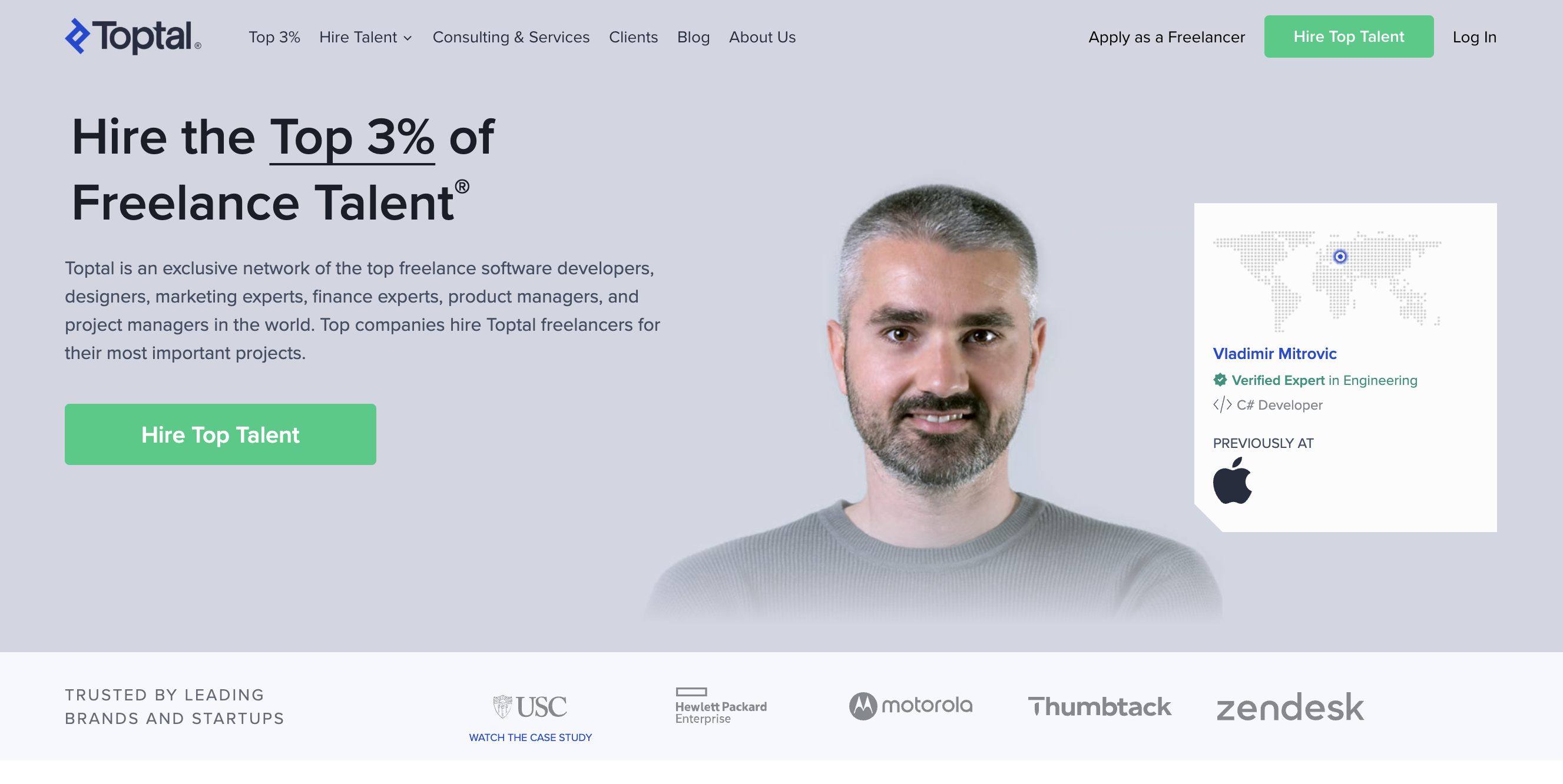
Indeed
Indeed is a comprehensive job board suitable for listing full-time WordPress developer positions, offering a broad audience reach.

Beyond the initial three platforms, there are several more that cater to different hiring needs. FlexJobs specializes in remote and flexible job listings, while Remote.co focuses on remote opportunities. For startups, AngelList is a great choice, and We Work Remotely is excellent for those open to remote roles. GitHub Jobs and Stack Overflow Jobs are tailored towards tech-focused positions, perfect for finding developers active in tech communities. Additionally, for creating and conducting assessments to evaluate your candidates, you might want to explore platforms like Adaface for efficient hiring processes.
Keywords to Look for in WordPress Developer Resumes
Resume screening is a time-saver when hiring WordPress developers. It helps you quickly identify candidates with the right skills and experience before moving to interviews.
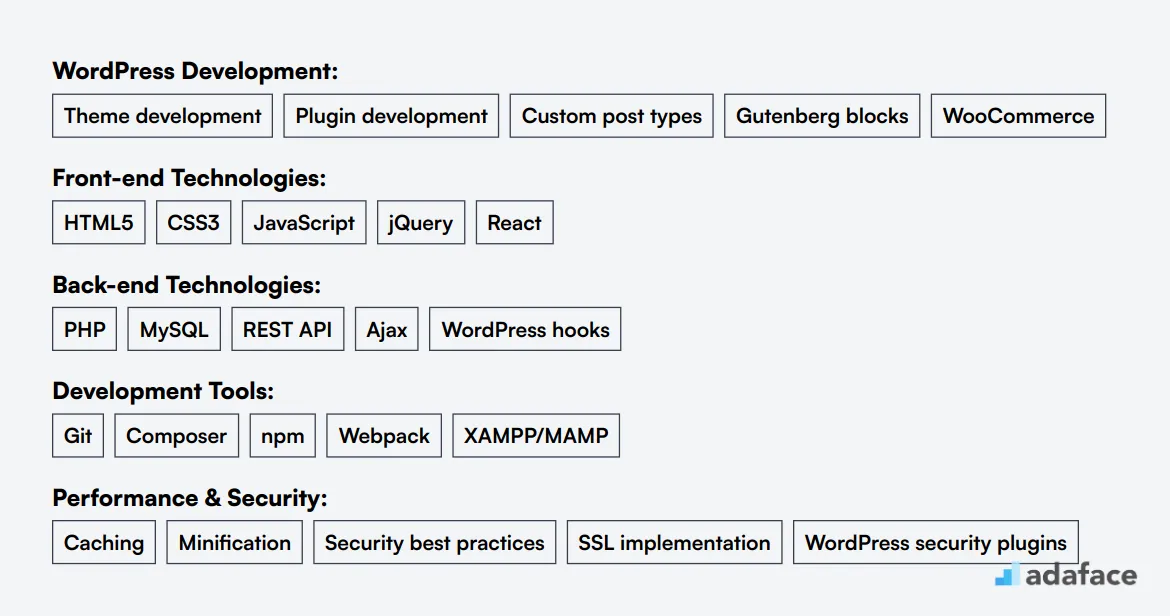
Focus on key WordPress-related terms when scanning resumes. Look for skills like PHP, HTML, CSS, JavaScript, theme development, and plugin creation. Also, check for experience with popular tools like WooCommerce and Gutenberg blocks.
AI tools can speed up resume screening for WordPress developers. You can use ChatGPT or similar AI-powered assessment platforms to analyze resumes based on your specific criteria.
Here's a sample prompt for AI-assisted resume screening:
TASK: Screen resumes for WordPress Developer role
INPUT: Resumes
OUTPUT: For each resume, provide:
- Candidate name and email
- Matching keywords
- Score (out of 10)
- Recommendation
- Shortlist decision (Yes/No/Maybe)
KEYWORDS:
- WordPress (themes, plugins, Gutenberg)
- PHP, HTML, CSS, JavaScript
- WooCommerce, REST API
- Version control (Git)
- Performance optimization
- Responsive design
Customize this prompt based on your specific WordPress developer job requirements.
Recommended skills tests to screen WordPress Developers
Skills tests are a straightforward way to evaluate a WordPress developer's ability, ensuring that candidates possess the necessary skills to succeed in the role. Here are our top recommendations for skills tests that will assist you in identifying the best WordPress talent.
The PHP & WordPress Online Test is designed to assess a candidate’s proficiency in PHP and WordPress, key technologies for any WordPress developer. This test covers everything from theme development to plugin creation, helping you find candidates with a strong command of WordPress-specific skills.
Use the JavaScript, HTML, PHP, SQL Test to evaluate your candidates' ability to utilize these foundational technologies. WordPress development often requires a good grasp of front-end and back-end coding, making this test a great choice to assess overall technical competency.
The WooCommerce Test is ideal if your projects involve e-commerce solutions. It measures a candidate’s understanding of essential WordPress e-commerce plugins, ensuring they can effectively integrate and customize WooCommerce for your business needs.
Consider the Web Developer Online Test to evaluate broader web development skills. This test spans multiple programming languages and frameworks, providing insight into a candidate's versatility and ability to adapt to various WordPress development challenges.
Lastly, the PHP Online Test targets general PHP skills, ensuring the candidates have a handle on server-side scripting vital for WordPress development. It's crucial for assessing their ability to write and manage the code that forms the backbone of WordPress websites.
Case Study Assignments to Hire WordPress Developers
Case study assignments are a great way to assess a candidate's practical skills and problem-solving abilities in real-world scenarios. However, they can be lengthy, leading to low test-taking rates and the possibility of losing talented candidates. Despite these drawbacks, well-designed case studies can provide valuable insights. Let's explore some effective case study assignments tailored for WordPress developers.
Custom WordPress Plugin Development: This case study involves creating a simple WordPress plugin that fulfills a specific requirement. It tests the candidate's knowledge of WordPress architecture and their ability to write clean and maintainable code. This task is recommended as it reflects the typical challenges WordPress developers face.
Theme Customization: Candidates are asked to customize a given WordPress theme to match a new design spec. It evaluates their understanding of WordPress themes, including template hierarchy and use of hooks. This assignment is ideal for assessing the candidate's front-end skills and attention to detail.
Integrating Third-Party APIs: This case study requires candidates to integrate a third-party API into a WordPress site. It tests their ability to work with external services and handle data within the WordPress environment. Understanding API integration is a skill required for WordPress developers, making this assignment particularly relevant.
Structuring the Interview Stage for WordPress Developer Hiring
After candidates pass the initial skills tests, it's time for technical interviews to assess their hard skills more deeply. While skills tests are great for initial filtering, technical interviews help identify the best candidates for the role. Let's look at some sample interview questions to evaluate WordPress developers effectively.
Consider asking: 'How would you optimize a WordPress site for speed?' This checks their understanding of performance optimization. 'Can you explain the WordPress theme hierarchy?' tests their knowledge of core WordPress concepts. 'How do you approach WordPress security?' evaluates their awareness of WordPress security best practices. 'Describe your experience with custom post types and taxonomies.' assesses their ability to extend WordPress functionality. 'How do you debug WordPress issues?' helps gauge their problem-solving skills in a WordPress context.
Understanding the Cost of Hiring a WordPress Developer
The cost of hiring a WordPress Developer can vary significantly based on experience, location, and skill set. On average, you might expect to pay between $42,000 to $103,000 per year in the United States, while Australian developers can earn anywhere from $91,562 to over $178,291 depending on the city.
It's important to consider that these figures can fluctuate based on the demand for talent in specific regions, as well as the complexity of the projects at hand. Having a clear understanding of salary ranges helps you make competitive offers that attract the right candidates.
WordPress Developer Salary in the United States
The average salary for WordPress Developers in the United States ranges from $42,000 to $103,000 per year, with a median of about $66,000. Location plays a big role in compensation, with cities like Los Angeles and New York offering higher salaries compared to smaller markets.
Top-paying cities include Los Angeles (median $106,000) and New York (median $94,000), while markets like Houston (median $37,000) offer lower compensation. Keep in mind that these figures can vary based on experience, skills, and specific job requirements.
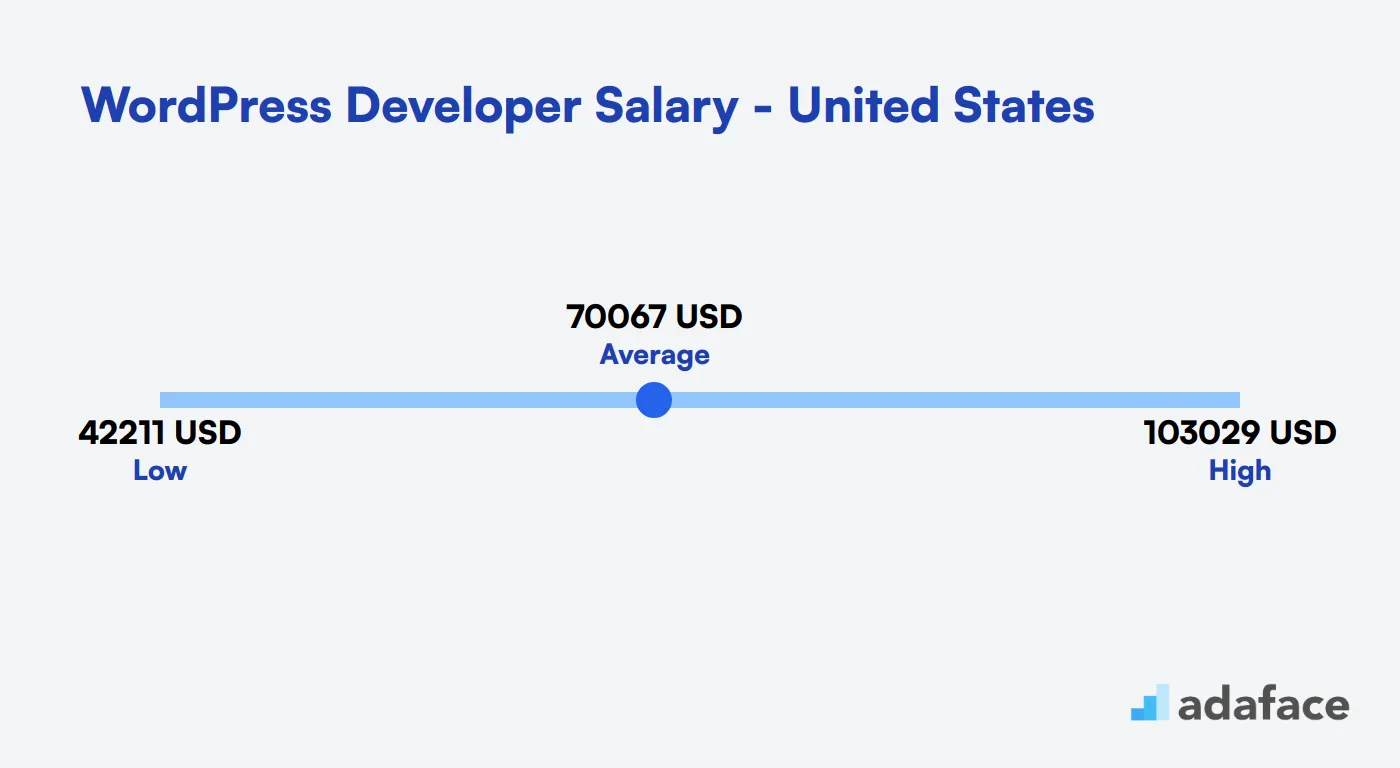
WordPress Developer Salary United Kingdom
In the United Kingdom, the average salary for a WordPress developer typically ranges from £30,000 to £50,000 per year, depending on experience and location. Entry-level positions might start at around £25,000, while more experienced developers can earn upwards of £60,000, particularly in major cities like London.
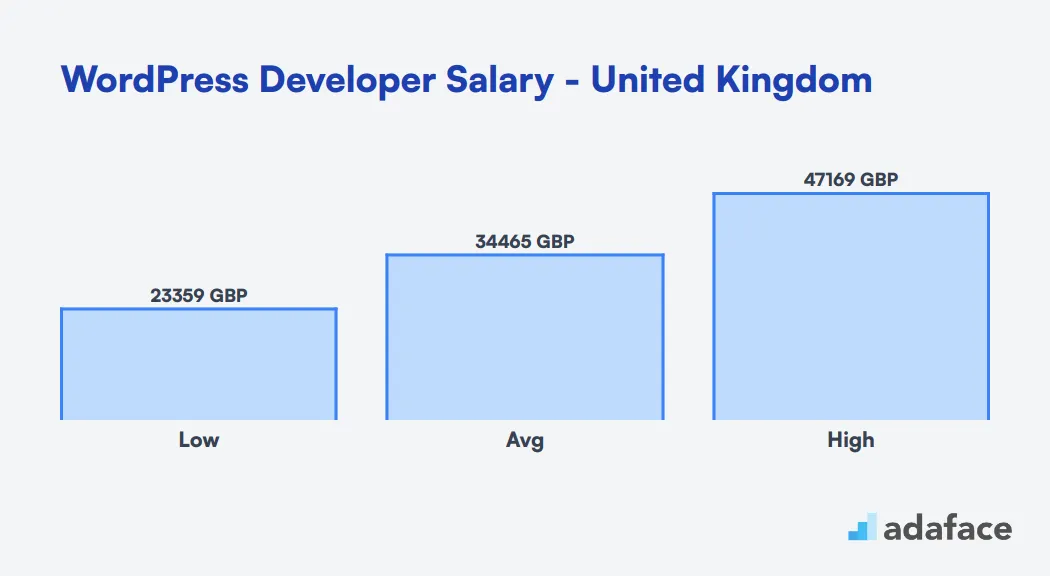
WordPress Developer Salary in Australia
The salary for a WordPress developer in Australia varies significantly based on location. As of now, developers in Sydney can earn between $96,526 to $178,291, with a median salary of around $131,186. In contrast, Melbourne offers a range from $68,241 to $131,527, while Brisbane's averages hover around $73,384 to $117,419.
On a national scale, the average salary for a WordPress developer in Australia is approximately $91,562, with the lowest reported salaries starting at $57,512. Understanding these numbers can help you set competitive offers and attract top talent.
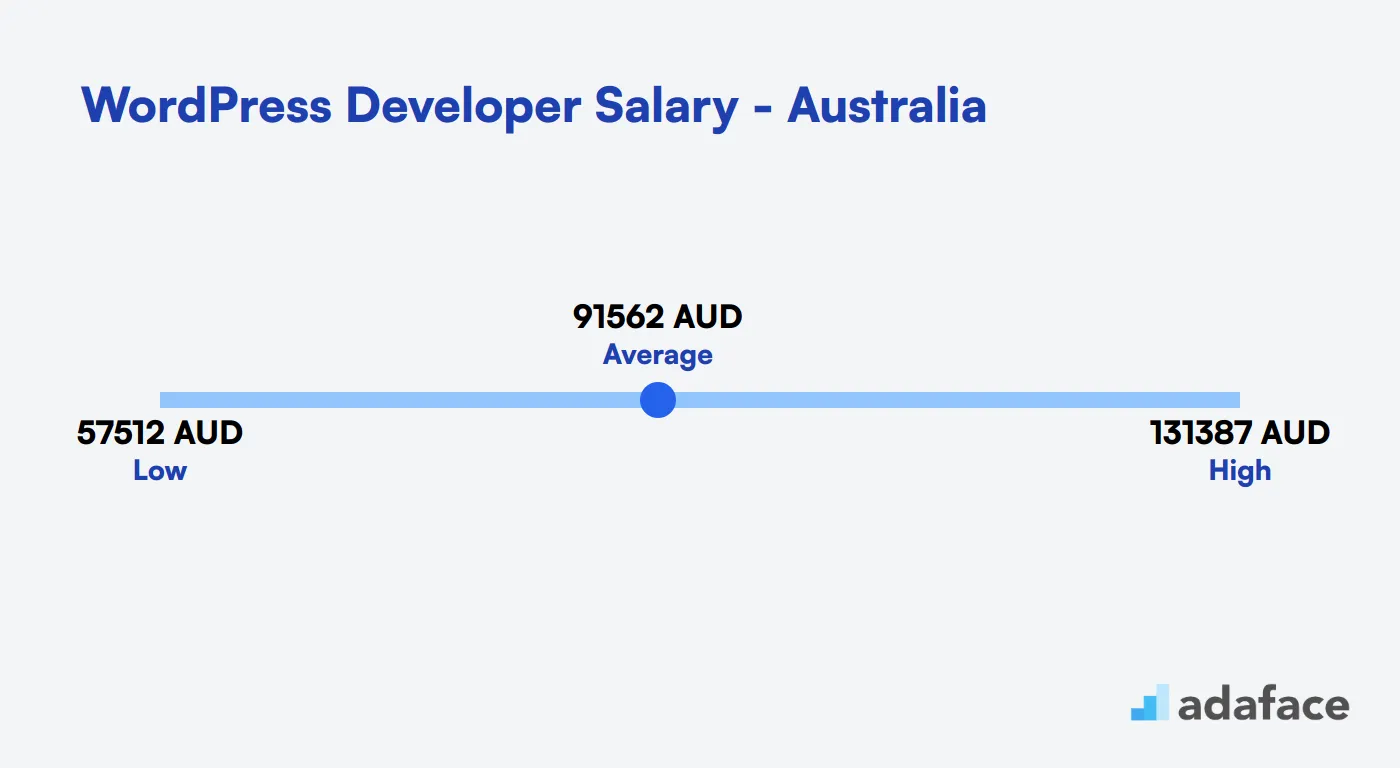
WordPress Developer Salary in Canada
The average WordPress Developer salary in Canada is approximately CAD 60,294. Salaries can range significantly based on location, with higher averages in cities like Burnaby and Montréal, where they can exceed CAD 88,000. Conversely, positions in Calgary or Edmonton may start around CAD 49,000, reflecting the regional differences in demand and cost of living.
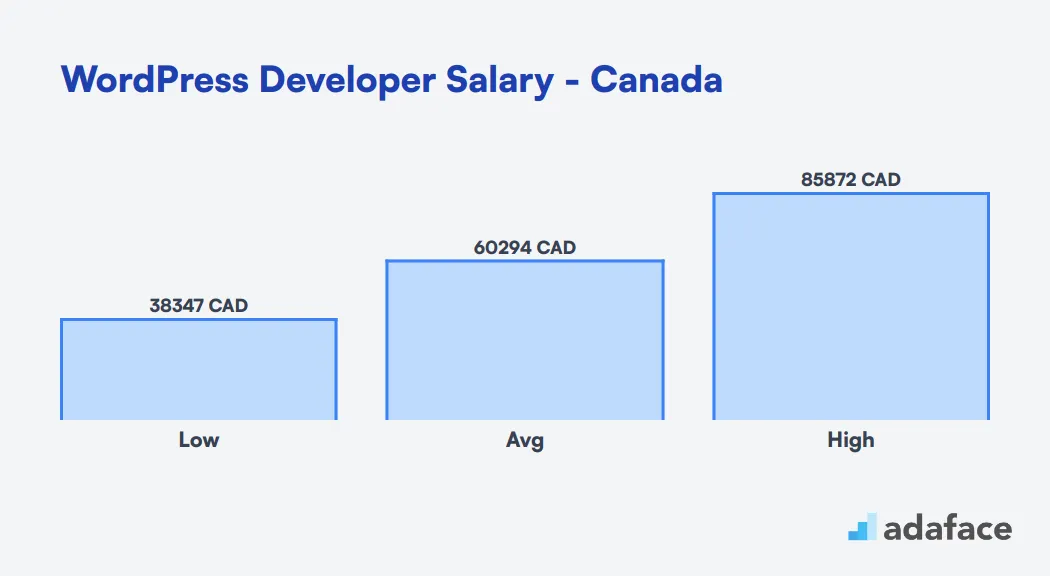
What's the difference between a WordPress Front-end Developer and a WordPress Back-end Developer?
People often confuse WordPress front-end developers and back-end developers because both roles contribute to building and maintaining a WordPress site. However, their focus areas and skill sets are quite different.
A WordPress Front-end Developer is mainly concerned with the site's look and feel. They work with HTML, CSS, and JavaScript to design and implement the user interface and user experience. Their responsibilities include modifying and styling CSS, customizing existing plugins, and optimizing the loading speed. Tools like Adobe XD, Sketch, and Figma are common in their toolkit.
On the other hand, a WordPress Back-end Developer focuses on the server-side logic and database management. They use PHP, MySQL, and REST API to develop and manage databases, create custom themes, and develop custom plugins. Their role requires them to optimize database queries and deal with backend vulnerabilities. Tools such as PHPStorm and MySQL Workbench are frequently used by back-end developers.
For more insights on the different skills required for these roles, you can visit our skills required for WordPress developer blog.
| WordPress Front-end Developer | WordPress Back-end Developer | |
|---|---|---|
| Primary Skills | HTML, CSS, JavaScript | PHP, MySQL, REST API |
| Responsibilities | Design and implement UI/UX | Develop and manage databases |
| Tools | Adobe XD, Sketch, Figma | PHPStorm, MySQL Workbench |
| Theme Customization | Modify and style CSS | Create custom themes |
| Plugin Involvement | Customize existing plugins | Develop custom plugins |
| Focus Area | User Experience | Server-side Logic |
| Performance Optimization | Optimize loading speed | Optimize database queries |
| Security Concerns | Front-end vulnerabilities | Backend vulnerabilities |
What are the ranks of WordPress Developers?
WordPress developers often have varying levels of expertise and responsibilities. Understanding these ranks can help recruiters and hiring managers find the right fit for their team's needs.
- Junior WordPress Developer: Entry-level position for those with basic WordPress knowledge. They typically work on simple theme customizations and plugin installations.
- Mid-level WordPress Developer: Experienced in building custom themes and plugins. They can handle more complex projects and may lead small teams.
- Senior WordPress Developer: Highly skilled professionals who can architect large-scale WordPress solutions. They often mentor junior developers and make strategic decisions.
- WordPress Architect: Top-tier experts who design and implement enterprise-level WordPress systems. They have deep knowledge of WordPress core and related technologies.
- WordPress Team Lead/Manager: Combines technical expertise with leadership skills. They oversee WordPress projects and teams, ensuring quality and timely delivery.
When hiring, consider using WordPress developer interview questions tailored to each rank to assess candidates effectively.
Hire the Best WordPress Developers
In this guide, we've covered the key aspects of hiring WordPress developers. From understanding the role to outlining the hiring process, we've explored the skills, qualifications, and platforms to find top talent. We've also discussed how to evaluate resumes, conduct interviews, and use case studies to assess candidates.
The most important takeaway is to use accurate job descriptions and skills tests to make your hiring process more effective. By combining these elements, you'll be better equipped to identify and hire WordPress developers who can truly contribute to your projects and team.
PHP & WordPress Developer Online Test
FAQs
When hiring a WordPress developer, look for proficiency in PHP, HTML, CSS, JavaScript, and an understanding of WordPress core, themes, and plugins. Familiarity with responsive design and SEO practices is also beneficial.
Popular platforms to find WordPress developers include freelance sites like Upwork and Fiverr, as well as job boards like Stack Overflow Jobs and GitHub Jobs.
A WordPress front-end developer focuses on the user interface and experience, ensuring the site looks good and functions well on the user's end. A back-end developer handles server-side tasks, managing databases and server integration, ensuring the site functions smoothly.
Structure the interview to cover both technical and soft skills. Include questions around past projects, problem-solving abilities, and technical knowledge. Consider incorporating a live coding test or a review of a portfolio.
You can use platforms like Adaface for skills assessments. They offer specialized tests like the PHP WordPress Online Test to evaluate candidates.
While DIY page builders can be useful for simple websites, hiring a WordPress developer allows for greater customization, scalability, and functionality tailored to specific business needs, ensuring a more professional and optimized website.

40 min skill tests.
No trick questions.
Accurate shortlisting.
We make it easy for you to find the best candidates in your pipeline with a 40 min skills test.
Try for freeRelated posts
Free resources



